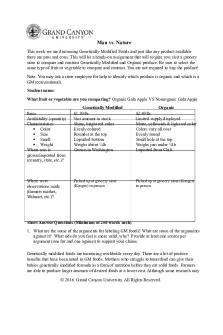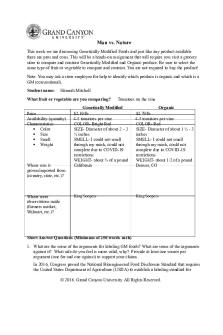Man VS Nature Worsksheet PDF

| Title | Man VS Nature Worsksheet |
|---|---|
| Author | Rachell Cheuvront |
| Course | Environmental Science |
| Institution | Grand Canyon University |
| Pages | 3 |
| File Size | 229.5 KB |
| File Type | |
| Total Downloads | 42 |
| Total Views | 170 |
Summary
Man VS Nature Worksheet Assignment for Enviornemental Science...
Description
Man vs. Nature This week we are discussing Genetically Modified Foods and just like any product available there are pros and cons. This will be a hands-on assignment that will require you visit a grocery store to compare and contrast Genetically Modified and Organic produce. Be sure to select the same type of fruit or vegetable to compare and contrast. You are not required to buy the product! Note: You may ask a store employee for help to identify which produce is organic and which is a GM (conventional). Student name: What fruit or vegetable are you comparing? Organic Gala Apple VS Nonorganic Gala Apple Price Availability (quantity) Characteristics: Color Size Smell Weight Where was it grown/imported from (country, state, etc.)?
Where were observations made (farmers market, Walmart, etc.)?
Genetically Modified $1.39/lb Vast amount in stock Shiny, bright red color Evenly colored Rounder at the top Lopsided bottom Weighs about ¼lb Grown in Washington
Organic $2.49/lb Limited supply displayed Matte, yellowish & light red color Colors vary all over Evenly round Small hole at the top Weighs just under ¼lb Imported from Chili
Picked up at grocery store (Kroger) in person
Picked up at grocery store (Kroger) in person
Short Answer Questions (Minimum of 250 words each) 1. What are the some of the arguments for labeling GM foods? What are some of the arguments against it? What side do you feel is more valid, why? Provide at least one source per argument (one for and one against) to support your claims. Genetically modified foods are increasing worldwide every day. There are a lot of positive benefits that have been noted in GM foods. Mothers who struggle to breastfeed can give their babies genetically modified formula as a form of nutrition before they eat solid foods. Farmers are able to produce larger amounts of desired foods at a lower cost. Although some research may © 2016. Grand Canyon University. All Rights Reserved.
suggest there is a slight chance of health risk from GM foods, years of consumption have proven there is no effect on overall health in people (Ruhs, 2013). These modified foods do not necessarily need to be labeled due to the fact that their production is strictly monitored in the United States. The government agencies that oversee the farmlands and production of these modified foods do not allow anything that is considered harmful to the general public to be released. Not labeling GM foods seems more valid because anyone who is concerned about GM foods can choose to purchase organic foods which are verified to be GM free. On the contrary, GM foods may need to be labeled if only for the few individuals who have an intolerance to the modifications. Organic foods are not affordable to all households. Often time, GM foods are more affordable and tend to have a longer shelf life. There are people who do not digest foods the same way most people do, this can cause them to become ill if they eat the wrong foods. The government does regulate GM foods, but they do not require these items to be labeled. According to some there are GM foods that can cause unintended harm if ingested by individuals and may even harm the environment (Maghari & Ardekani, 2011). Providing labels on these foods will help people be more aware of what they are eating as well as how safe/unsafe these items are. Maghari, B. M., & Ardekani, A. M. (2011). Genetically Modified Foods and Social Concerns. Avicenna Journal of Medical Biotechnology, 3(3), 109–117. Ruhs, B. (2013). Update: GMOs in Foods. Environmental Nutrition, 36(2), 1–6.
2. What are some ethical concerns or benefits of using GMOs based on the Christian Worldview? (Refer to “Here’s What Religious Experts Have to Say About Faith and GMOs” for help answering this question. The Christian Worldview believes that the hungry should be fed, meaning if it is possible no person should feel the ache of an empty stomach. GMOs can bring in a benefit of creating crops that can potentially create a larger amount of food, which in turn means more food to feed the hungry. Unfortunately, there is still a lot to learn about GMOs in food. If science proves that foods that are genetically modified actually provide no nutritional benefit or harm humans then they are essentially useless to society. Another concern that is brought to light with GMOs is the possibility of creating a culture of dependency to the new seeds created by GMOs (Smith, 2015). Christian worldview believes that everything God created has a purpose and can be used to glorify God. If plants are created with GMOs and God is removed from their creation, their purpose is also removed. The Christian worldview is dependent on God as the provider, GMOs could remove God from the equation. Some people may believe that the way God originally created food is sufficient and should not be messed with. However, if done properly and with focus remaining on God as the Creator, GMOs can add a vast amount of food for availability to feed the poor and hungry. Afterall, God created humanity with intelligence; this means that intelligence should be used to benefit others. © 2016. Grand Canyon University. All Rights Reserved.
If GMOs can create an abundance in healthy foods in a way that makes these foods easily available to the needy then whose to say it is against God or the Christian Worldview?
Smith, M., (2015) Here’s What Religious Experts Have to Say About Faith and GMOs. Vice News. Retrieved from https://www.vice.com/en/article/neyw5z/heres-what-religious-expertshave-to-say-about-faith-and-gmos
© 2016. Grand Canyon University. All Rights Reserved....
Similar Free PDFs

Man VS Nature Worsksheet
- 3 Pages

Man vs Nature
- 3 Pages

Man vs Nature Assignment
- 2 Pages

Man vs Nature
- 3 Pages

Nature vs nurture
- 5 Pages

Nature VS Nurture Essay
- 6 Pages

Nature VS Nurture essay
- 6 Pages

Chapter 3 Nature VS Nurture
- 5 Pages

Nature vs Nurture - Grade: A
- 3 Pages

Nature vs Nurture - Grade: B+
- 6 Pages

8. Nature vs. Nurture Case Study
- 3 Pages
Popular Institutions
- Tinajero National High School - Annex
- Politeknik Caltex Riau
- Yokohama City University
- SGT University
- University of Al-Qadisiyah
- Divine Word College of Vigan
- Techniek College Rotterdam
- Universidade de Santiago
- Universiti Teknologi MARA Cawangan Johor Kampus Pasir Gudang
- Poltekkes Kemenkes Yogyakarta
- Baguio City National High School
- Colegio san marcos
- preparatoria uno
- Centro de Bachillerato Tecnológico Industrial y de Servicios No. 107
- Dalian Maritime University
- Quang Trung Secondary School
- Colegio Tecnológico en Informática
- Corporación Regional de Educación Superior
- Grupo CEDVA
- Dar Al Uloom University
- Centro de Estudios Preuniversitarios de la Universidad Nacional de Ingeniería
- 上智大学
- Aakash International School, Nuna Majara
- San Felipe Neri Catholic School
- Kang Chiao International School - New Taipei City
- Misamis Occidental National High School
- Institución Educativa Escuela Normal Juan Ladrilleros
- Kolehiyo ng Pantukan
- Batanes State College
- Instituto Continental
- Sekolah Menengah Kejuruan Kesehatan Kaltara (Tarakan)
- Colegio de La Inmaculada Concepcion - Cebu




